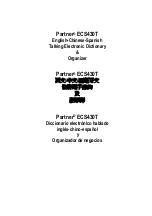
9
Names of Things and What They Do
[
] button, [
] button
You can use the [
] [
] buttons to move the cursor that is shown at CTRL MAP,
PGM CHANGE, MIDI CH, or USER ASSIGN in the display.
Controllers [B1]–[B4] (button)
You can assign any desired MIDI messages to these buttons.
“Assigning MIDI Messages” (p. 29)
[SPLIT] button, [DUAL] button, [LOWER] button, [UPPER] button
[SPLIT] button
Use this button to split the keyboard into right (UPPER) and left (LOWER) areas so that
you can play a different sound in each area.
[DUAL] button
Use this button to play two sounds layered.
[LOWER] button
Use this button to play the LOWER part.
[UPPER] button
Use this button to play the UPPER part.
[SHIFT] button
When you’re in PLAY mode (p. 41), you can hold down the [SHIFT] button and use
controllers [B1]–[B4], the [DUAL]/[LOWER]/[UPPER] buttons, the [TRANSPOSE] button,
and the OCTAVE [–] [+] buttons as a numeric keypad. Hold down the [SHIFT] button and
press the [SPLIT] button for backspace.
[TRANSPOSE] button
This button lets you shift the pitch of the keyboard up or down in steps of a semitone.
OCTAVE [–] [+] buttons
These buttons let you shift the pitch of the keyboard up or down in steps of one octave.
Bender lever
Use this to change the pitch or apply vibrato.
You can also assign a desired MIDI message to this lever as a controller.
➝
“Assigning MIDI Messages” (p. 29)
4
5
6
7
8
9
10
A-300_500_800C_e.book 9 ページ 2010年2月22日 月曜日 午後9時13分










































